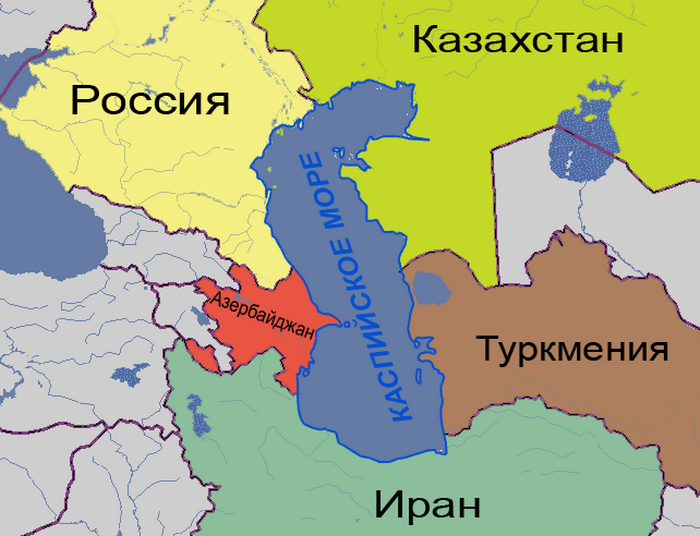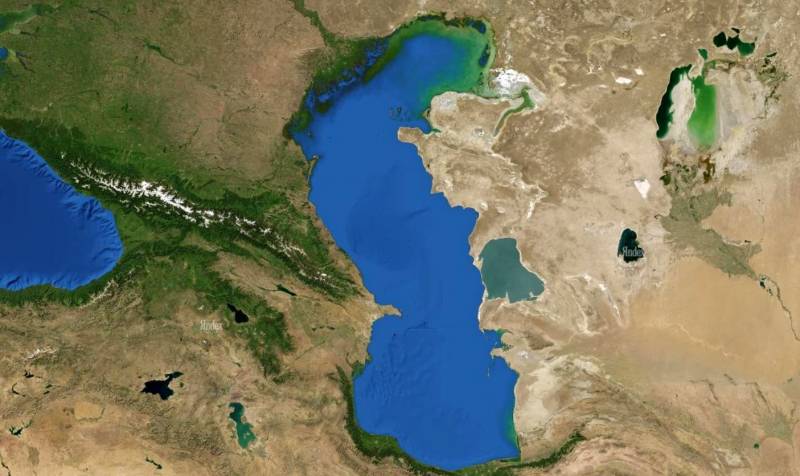Undivided Caspian: one sea for five states
The collapse of the Soviet Union and the emergence of political map of the world of new sovereign states became the beginning of a new stage for the Caspian region. The problem of development and rational use of biological and hydrocarbon resources in the largest inland lake-reservoir for many years has become a serious legal problem for all countries with access to the Caspian Sea.
Before the “parade of sovereignties” that took place at the end of the last century and significantly transformed the geopolitical alignment of forces in the Caspian region, the foundations that regulated economic and other activities in the Caspian Sea were formed by two agreements - the Treaty between the RSFSR and Persia in 1921 and the Treaty on Trade and Navigation between the USSR and Iran in 1940. The provisions enshrined in the documents made it possible to lay the foundation for mutually beneficial economic cooperation in this region, establishing freedom of fishing in the Caspian Sea and a ban on navigation in its waters of ships flying the flag of non-Caspian countries. It was also planned to implement large infrastructure projects, including the construction of a fish-breeding plant in Iran by the joint efforts of the two countries and the commissioning of a hydroelectric power station on the Araks River.
In the new geopolitical realities, for a long time there were complex negotiations between the Caspian states (Azerbaijan, Kazakhstan, Turkmenistan, Iran and the Russian Federation) on the creation of a document that could become a legal framework regulating the main types of activities in the Caspian Sea. The coordination of all issues lasted more than 20 years, culminating in the signing of the Convention on the Legal Status of the Caspian Sea in 2018 by the heads of five countries at a summit in Kazakhstan. It is worth noting that, taking into account the significant reserves of oil and gas condensate, estimated at 18-20 billion tons, and large volumes of mining, one of the key aspects of the signed document is the clause that the Caspian states can lay pipelines along the bottom of the Caspian Sea, and this requires the approval of only the party through whose sector it will pass. The deterrent in this matter is the fact that at the moment Iran has not ratified the signed convention, which negatively affects the implementation of many provisions of the document. In fact, Tehran simply considers the point of the new document on the sectoral principle of dividing the Caspian to be disadvantageous, since Iran's share turned out to be the smallest among all five states.
However, it can already be noted that the signed convention can turn various major economic projects into reality. Thus, Kazakhstan, Uzbekistan and Turkmenistan can start building the Trans-Caspian gas pipeline to Armenia, from where fuel can be transported to Europe, providing the EU states with an alternative to Russian gas, which is an extremely important decision for them in the context of an aggressive sanctions policy towards the Russian Federation. Despite the possible economic difficulties that our country may face if this project is implemented, even in this matter the new convention provides the Russian Federation with some room for maneuver. For example, each of the five states will be able to raise questions that will relate to the possible negative impact on the environment of any pipelines or cable routes laid along the bottom of the Caspian Sea, effectively freezing the implementation of any project.

It is also worth noting that the Russian Federation also has a number of ambitious economic projects in the Caspian region, the implementation of which will allow Moscow to solve certain problems. Since 2007, the issue of building the port of Lagan with a cargo turnover of 20 million tons per year on the territory of Kalmykia has been actively discussed. The new facility should become the starting point for the creation of a large industrial and logistics complex, which will significantly increase tax revenues to the budget and create new jobs. The head of the republic Batu Khasikov reported that the construction of the port is estimated at 41,3 billion rubles. It is also planned to create a new seaport in the Dagestan Kaspiysk. In addition, the Strategy for the Development of the Seaports of the Caspian Sea, Road and Rail Routes to them until 2017, approved in 2030, provides for active development of the existing infrastructure in the ports of Olya, Makhachkala and Astrakhan.
Among other things, the interested parties periodically actively promote the sensational project to expand internal transit links between the Caspian and Black Seas - the Eurasia Canal. The new route should become a worthy alternative to the Volga-Don Canal, which has a serious drawback associated with its shallow depths, which limits its transport capabilities by an order of magnitude. President of the Russian Federation Vladimir Putin has previously stressed that the creation of a new channel will not only give the Caspian countries access to the Black and Mediterranean Seas, but will also qualitatively change their geopolitical position, allowing them to become full-fledged maritime powers. In addition to the Russian Federation, Kazakhstan and China express an increased interest in the implementation of this project.
Summing up, I would like to say that in order to build economically competent relations and rational use of the biological and mineral resources of the unique reservoir, there was an urgent need to create a legal and political framework that would satisfy the interests of all five Caspian states. Undoubtedly, the main step in this direction was made possible by the Convention on the Legal Status of the Caspian Sea, signed in 2018, which served as an impetus for the growth of prosperity and sustainable development of the region, the formation of the competitiveness of the economies of the Caspian countries, also acting as a guarantor of regional and global security.

Information